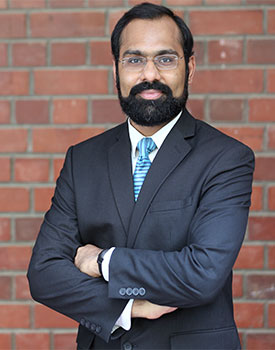Dr. Ashish Bharadwaj is professor & dean, Jindal School of Banking & Finance (JSBF), at the O.P. Jindal Global University, Sonipat (Haryana). Excerpts from an interview.
How is the programme curriculum and pedagogy distinct from other conventional programmes?
 The undergraduate commerce curriculum for honours students at JSBF is designed keeping in mind students’ aspirations and competencies. The four pathways offered to students allow them to customise their own coursework. These pathways are financial planning & risk management; banking laws & financial regulations; fintech & analytics, and global consulting & entrepreneurship. Each pathway lays strong emphasis on global exposure and on building essential 21st century skills. Our students learn a variety of subjects ranging from financial technologies to corporate finance; from financial valuation to risk management, from Fintech and blockchain to advanced analytical and data visualisation software. As a result, they can comprehend complex issues and are prepared to ask the big questions.
The undergraduate commerce curriculum for honours students at JSBF is designed keeping in mind students’ aspirations and competencies. The four pathways offered to students allow them to customise their own coursework. These pathways are financial planning & risk management; banking laws & financial regulations; fintech & analytics, and global consulting & entrepreneurship. Each pathway lays strong emphasis on global exposure and on building essential 21st century skills. Our students learn a variety of subjects ranging from financial technologies to corporate finance; from financial valuation to risk management, from Fintech and blockchain to advanced analytical and data visualisation software. As a result, they can comprehend complex issues and are prepared to ask the big questions.
How does the school ensure that graduating students are industry-ready?
We recognise the need to balance theory with practice for students at every level. The CFA Club, organised and managed by JSBF’s faculty, provides comprehensive support and guidance to students aspiring to qualify as professional chartered and financial analysts. Selected final year B. Com (H) students are prepared to write the level 1 CFA exam. Moreover, our students earn certificates for courses on ‘financial modelling & valuation’ and ‘financial accounting’ from two global consulting firms — Ernst & Young (EY) and KPMG, respectively. Students looking for careers in equity, commodities, derivatives, foreign currency and mutual funds markets receive academic support in completing certificate courses offered by SEBI’s National Institute of Securities Markets and the NSE’s Academy Certification in Financial Markets. Our rigorous coursework also ensures students learn leadership, communication and management skills.
What kind of institutional tie-ups does the school have to facilitate internships and international exposure overall?
Global exposure is a key attribute of JSBF. JSBF takes advantage of more than 250 collaborations that JGU has entered into and fostered over the years with top universities in over 50 countries. We offer a specially designed certificate programme titled ‘business, finance and entrepreneurship for leaders of tomorrow’ for B. Com. (H) students by the world-renowned Wharton School of the University of Pennsylvania (USA) and ISDE, Madrid (Spain). We also offer our students several semester exchange and study abroad programmes. To complement their international exposure, students are given the option of learning a foreign language on campus including German, Spanish, French and Mandarin. Some of our students have been offered internships abroad. Some of our students have been offered internships abroad, which enhanced their overall learning and exposure.
Why does the school emphasise on an interdisciplinary model of learning? Also, why is it important?
You don’t get harmony if everyone sings the same note. The great financial crisis, which destroyed much of global wealth, is a decade behind us. Studying commerce and finance holistically is the need of the hour. At JSBF, we have re-imagined and re-structured commerce education by relying on interdisciplinary education, which is a core strength of JGU. We want future financial advisors and practitioners to understand corporate governance and business ethics. We want entrepreneurs and venture capitalists to understand the disruptive nature and business potential of new technologies. We also want our graduates to understand the political economy of finance as well as leadership skills. Students are offered over 60 elective courses across eight schools of JGU to choose from. Students at JSBF get a broader perspective of how the world really works with social, ethical, political, cultural, legal and of course financial dimensions.
What are some of the emerging career opportunities graduating students can look forward to?
Our students learn how to interpret and visualise data and gradually develop an understanding of the regulatory environment within which financial management & reporting takes place. They master the art of communicating the nature of corporate finance in academic or business forums. Learning about the nature and implications of new technologies is a major pillar of our programme. Our students understand and explore the mechanics of Fintech/Blockchain, Artificial Intelligence, and Internet of things, how laws impact their adoption and how to develop a business case around them. As a result, a wide range of career options are open to our graduates including financial and investment management, portfolio management and private banking apart from contributing to family-run businesses or kick-starting their own ventures through innovations. Several students aspire to become corporate lawyers and they are motivated and trained accordingly. A significant number of students want to sign up for postgraduate programmes including LLB, MBA, Master in Finance, Accounting or Analytics at JGU or one of our 250-plus international partners.























